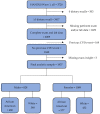Usual Intake of Flavonoids Is Inversely Associated with Metabolic Syndrome in African American and White Males but Not Females in Baltimore City, Maryland, USA
- PMID: 35565891
- PMCID: PMC9100333
- DOI: 10.3390/nu14091924
Usual Intake of Flavonoids Is Inversely Associated with Metabolic Syndrome in African American and White Males but Not Females in Baltimore City, Maryland, USA
Abstract
Despite research that suggests flavonoids protect against metabolic syndrome (MetS) and evidence that intake of these compounds differs by race, knowledge about whether flavonoid-MetS associations vary among racial groups is limited. This study sought to estimate usual total flavonoid intake in African American and White adults and assess its sex- and sex/race-specific associations with MetS and its risk factors. Analysis of cross-sectional data from 1837 adults participating in the Healthy Aging in Neighborhoods of Diversity across the Life Span (HANDLS) study were analyzed. Usual total flavonoid intake was estimated using the NCI Method, and logistic regression measured its linkages with health outcomes. Among males overall and when stratified by race, odds of MetS and its risk factors low high-density lipoprotein cholesterol (HDL-C) and elevated glucose were lower at the 75th percentile of usual total flavonoid intake than at the 25th percentile (OR for MetS = 0.62; 95% CI = 0.53, 0.71). However, low HDL-C and elevated glucose were positively associated with usual flavonoid intake among females. The comparable associations by race within sex imply that the relationships between flavonoid and health outcomes may be evident across an array of intakes.
Keywords: Healthy Aging in Neighborhoods of Diversity across the Life Span (HANDLS) study; diet; flavonoids; metabolic syndrome; racial differences; usual intakes.
Conflict of interest statement
The authors declare no conflict of interest.
Figures
References
-
- Alberti K.G.M.M., Eckel R.H., Grundy S.M., Zimmet P.Z., Cleeman J.I., Donato K.A., Fruchart J.C., James W.P., Loria C.M., Smith S.C., Jr. Harmonizing the metabolic syndrome: A joint interim statement of the International Diabetes Federation Task Force on Epidemiology and Prevention; National Heart, Lung, and Blood Institute; American Heart Association; World Heart Federation; International Atherosclerosis Society; and International Association for the Study of Obesity. Circulation. 2009;120:1640–1645. doi: 10.1161/CIRCULATIONAHA.109.192644. - DOI - PubMed
-
- Chiavaroli L., Viguiliouk E., Nishi S.K., Blanco Mejia S., Rahelić D., Kahleová H., Salas-Salvadó J., Kendall C.W., Sievenpiper J.L. DASH dietary pattern and cardiometabolic outcomes: An umbrella review of systematic reviews and meta-analyses. Nutrients. 2019;11:338. doi: 10.3390/nu11020338. - DOI - PMC - PubMed
-
- Godos J., Zappalà G., Bernardini S., Giambini I., Bes-Rastrollo M., Martinez-Gonzalez M. Adherence to the Mediterranean diet is inversely associated with metabolic syndrome occurrence: A meta-analysis of observational studies. Int. J. Food. Sci. Nutr. 2017;68:138–148. doi: 10.1080/09637486.2016.1221900. - DOI - PubMed
MeSH terms
Substances
Grants and funding
LinkOut - more resources
Full Text Sources
Medical


